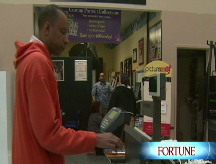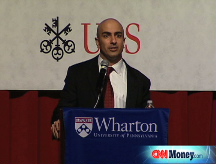AmEx becomes bank to stabilize funding
The Federal Reserve grants the company's request to become bank holding company, giving it access to better funding at time when securitization dries up.
NEW YORK(CNNMoney.com) -- Seeking shelter amid a global credit crunch and consumer spending slowdown, American Express announced Monday it is becoming a bank.
The Federal Reserve, using emergency power to act swiftly, granted approval for AmEx and American Express Travel Related Services to become bank holding companies.
The move will give AmEx the ability to grow its deposits - a more stable form of funding - and provide it greater access to Fed funding and government rescue programs.
"Given the continued volatility in the financial markets, we want to be best positioned to take advantage of the various programs the federal government has introduced or may introduce to support U.S. financial institutions," said Chief Executive Kenneth Chenault in a statement.
The company currently operates a small bank, American Express Centurion Bank, as well as a savings and loan, American Express Bank, which together have just over $50 billion in assets and $14.4 billion in deposits. They offer mainly credit cards, loans and certificates of deposit, the company said.
"We will continue to build a larger deposit base to broaden our funding sources," said Chenault. "With Federal Reserve oversight we should gain greater access to the capital on offer under the current and any future government-sponsored programs."
On Oct. 3, the bank subsidiaries were given access to the Fed funding window, giving the company an alternate financing source, according to federal filings.
AmEx also said late last month it would issue short-term debt through the Fed's Commercial Paper Funding Facility, which provides company with financing for its day-to-day operations.
It did not say whether it would seek access to capital injections from the federal government under the $700 billion financial institution rescue plan.
The shift will also subject it to increased regulation by the Fed.
As an independent specialty finance company, AmEx relied greatly on bundling its credit card loans into securities and selling them to investors. But this securitization market has dried up in the wake of the mortgage meltdown.
Since it doesn't have bank deposits as a cushion, AmEx is too vulnerable to funding disruptions, said Howard Shapiro, analyst at Fox-Pitt Cochran Caronia.
"It's all because of funding concerns," he said. "It's become prohibitively expensive to securitize. This is a way of accessing cheaper forms of liquidity."
The surprise announcement comes less than two weeks after the credit card issuer announced it was laying off 7,000 people after reporting a 24% drop in quarterly profits. AmEx also said it would cut overhead expenses, including spending on business consultants, travel and entertainment, as well as scale back spending on business development and streamline costs associated with some rewards programs.
Rating agencies and analysts voiced concerns about the company's ability to withstand a prolonged, deep recession. Moody's downgraded the company last month on concerns that AmEx may not be able to weather this potentially severe consumer-led economic downturn as well as previous recessions.
Though it beat expectations for the quarter, executives said last month they anticipate the global economy to continue weakening well into 2009.
AmEx also attempted to address shareholders' liquidity concerns, stressing it could fund its business for at least a year and that it has access to various programs set up by the federal government to support businesses during these difficult times.
The Fed noted in its release that AmEx and its banks are well capitalized.
The shift, however, indicates deep problems at the company, said Red Gillen, senior analyst at Celent.
"They are clearly in trouble," he said. "I don't know if we knew how bad things actually were even two weeks ago."
AmEx (AXP, Fortune 500) stock fell $1.45 to $22.52 in mid-day trading Tuesday, down from its previous close of $23.98.
AmEx is the third financial company to convert to a bank holding company since the global credit crunch heightened in mid-September. Goldman Sachs and Morgan Stanley, Wall Street's last two remaining stand-alone investment banks, converted to bank holding companies a week after Lehman Brothers filed for bankruptcy. ![]()






